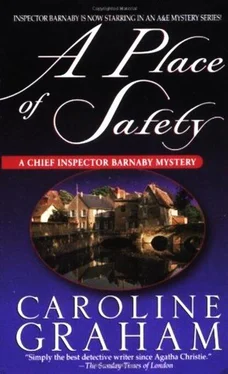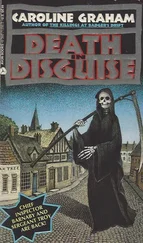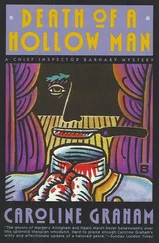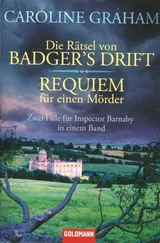While he was looking for somewhere to stay he was offered the attic flat in his publisher’s house in Hampstead. The usual tenant, the publisher’s son, was now in his third year at Oxford and rarely at home. Though it was rather cramped, Valentine settled there and gradually gave up the idea of looking for another place until the future became more clear. Not that he would have used such a phrase. He rarely thought beyond the present day or even the present moment, simply drifting through the hours in a state of stupefied loneliness.
Louise rang constantly. In the end he used to pull the plug, sometimes for days at a time. Once or twice, at her insistent persuasion, they met for lunch but it was not a success. Val was not hungry and her worried urging that he must eat got on his nerves. The second time they parted, Louise was struggling not to cry and Val was guiltily assuring her that it was all his fault before hugging her in a stiffly formal way and saying, ‘Keep in touch.’
In the train returning to Great Missenden, Louise’s natural resilience reasserted itself. It followed that these things took time. She just hadn’t appreciated quite how much time. Everything would be all right, eventually. Still, she was rather glad, getting into her little yellow car at the station, that she would not be going home to an empty house.
When Ann was finally ready to leave hospital for what she had been warned might be quite a lengthy period of convalescence, she was unsure where to go. Her soul revolted at the idea of returning to the Old Rectory. The image of her childhood home had become so abhorrent she almost felt she never wanted even to see it again. But her only relative was an elderly aunt in Northumberland whom Ann had not seen for almost twenty years, during which their correspondence had been perfunctory to say the least. There was also the necessity, as a post-operative outpatient, to be near the hospital. Then, as the day of her release drew near, Louise suggested to Ann that she stay at Fainlights.
Louise had visited Stoke Mandeville almost every day and though very little was said on either side, the long silences were never uncomfortable. Both women, having grown confident in each other’s company, felt the arrangement would suit them.
Inevitably there was a certain awkwardness when Ann first arrived. They had to get used to living together. Ann wanted to do more than she was able out of gratitude. Louise refused all help, convinced she could manage by herself, though for years she’d never tried. (On hearing of Valentine’s crime and subsequent arrest, the domestic agency promptly struck the name Fainlight from their books.)
Eventually it was Hetty, calling in frequently anyway to see Ann, who started helping out. This suited everyone. Louise because she didn’t have to do housework, which she loathed. Ann because she loved seeing Hetty, almost the only constant in her life from its very beginning. And Hetty because she needed the money for removal expenses. She had managed to get a council exchange for a house nearer Pauline and the family. True, Alan and his mates were sorting out the move so she only needed enough for the hire of a van plus the cost of a crate of beer and fish and chips all round, but Hetty liked to pay her way.
Once the news got around that Mrs Lawrence was well enough to see people, the village began to arrive with small gifts: books or flowers or homemade cakes and sweets. Someone brought a handkerchief exquisitely embroidered with her name. Ann was frequently moved to tears by such kindness. Louise, a bit put out at first at the never-ending stream of well-wishers, eventually got to quite enjoy the company. She would put the kettle on, get a cake out and make people welcome. Assorted dogs also came and went. Louise, never previously interested in animals, got so fond of Candy she seriously thought of getting a pet herself.
But all of this was daytime business. After dark things were more difficult. This was the most painful time for the two women. The time when their friendship, which was to endure for the rest of their lives, was truly forged.
Louise had asked advice from the hospital almoner before collecting her friend. She had been told to expect possible sleepless nights and instructed on how to cope with nightmares as well as what was described as post-traumatic stress. But, to her immense relief, Ann remembered nothing of the attack or even of driving into Causton. The last thing she said she could recall was knocking on the door of Lionel’s study to tell him lunch was ready. The one thing Louise had not been prepared for and found hard to cope with was Ann’s overwhelming sense of guilt and remorse.
Ann simply could not rid herself of the conviction that she could have prevented the whole tragic business if only she had had the strength of mind to stand up to her husband in the matter of Terry Jackson. She had known from the first that there was something dangerous about him. This fear had made her refuse to have the man in the house yet she had not had the courage to demand that he be banished entirely. If only she had ... So Ann had wept and blamed herself and Louise had comforted her and assured her she was blameless.
This wretched scenario was repeated day after day. Louise listened sympathetically at first even though she considered such protestations of guilt to be quite unfounded. Then they began to seem to her neurotic. Eventually, when her endless assurances seemed hardly to be listened to, she had got angry. Concealed her anger then couldn’t conceal it. Showed it and Ann got even more upset. Then Ann got angry.
Between them, helped by an awful lot of wine, they gradually washed with their tears, and hung out to dry, their deepest and most secret fears and longings. Ann wept for her years of loneliness and out of a passionate regret for a sterile half-life, Louise for the failure of a marriage she had thought made in heaven, for the loss of the brother she had known and for the sad, shambling counterfeit that had taken his place. For both of them, Louise so austere, aloof and cynical, and Ann so repressed, shy and anxious, this emotional exposure was a new and rather alarming experience.
Afterwards they were reserved, even a bit cool with each other. Several days were spent like this but the memory of their previous closeness was always there, a subterranean warmth, and gradually they relaxed again into comfortable familiarity.
They talked about money. Neither woman would have any serious worries although Louise would be by far the better off. Goshawk Freres had finally agreed on the amount for her golden handshake. Although somewhat depleted by litigation fees, it was still handsome. Her share of the Holland Park house, now sold, was over two hundred thousand pounds. And, sooner rather than later, she would be working again.
Ann was unsure that she would ever be working. The vivid longings for a new life, the daydreams which had seemed so exciting and realisable when she had been driving along in the sunshine towards Causton singing ‘Penny Lane’ had been wiped from her mind by the blow she had received. But the memory of her husband’s scathing remarks had not. Didn’t she know that these days people were made to retire at forty? As she had never had to cope with real life, how on earth could she possibly ever expect to do a real job?
Louise was furious when she heard all this. Ann was barely middle-aged, very intelligent, a pleasure to look at (or would be when Louise had finished with her), and she could do anything in the world she wanted to do. So there. Ann smiled and said she would have to see how things went.
The Old Rectory, the estate agent promised, would make a very good price especially as it had what he called ‘a granny flat’. The income from her trust fund, which now supported one person instead of two adults plus a steady stream of hangers-on and an old, infirm car would be more than adequate for her simple needs.
Читать дальше












